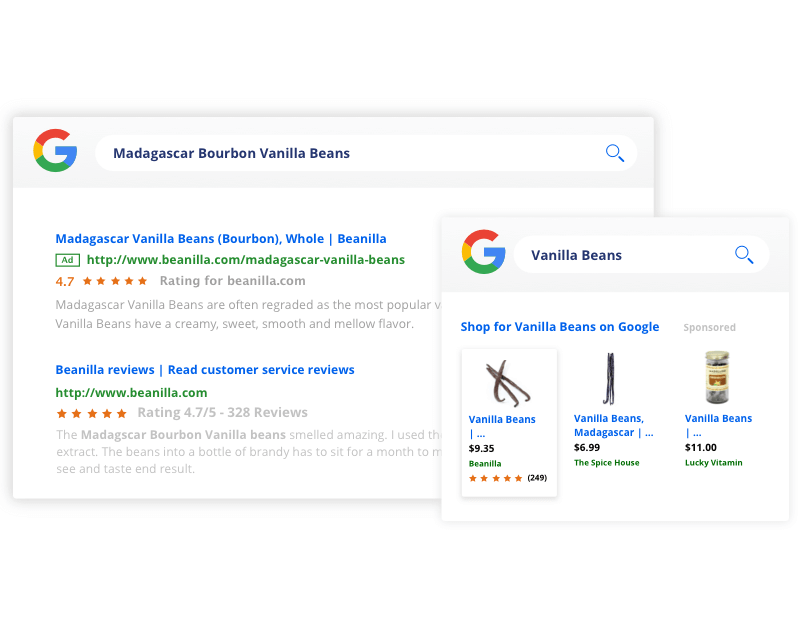
Why do reviews matter for SEO?
SEO rankings are placing more weight than ever on what users have to say. Reviews are one form of user-generated content that search engines take into consideration. User-generated content racks up serious SEO points by providing sites with fresh content, bundles of backlinks, and sources for organically shaping natural attributes.
5 reasons why reviews benefit SEO
Learn exactly why customer reviews are so good for helping you rise in search engine results.
1. Reviews provide search engines with fresh, relevant content
It’s not always possible (or beneficial) for a brand to churn out tons of new content, especially if this content is specifically produced for SEO purposes, but search engines want to see your site is active, so what’s a brand to do? Collect user-generated content!
Consumer-generated media is a low-effort way to power your site and social media channels with unique, authentic content. This fresh, relevant content shows your site is active and valuable to the customers you cater to.
Additionally, it creates conversations among customers to demonstrate you aren’t just talking to your customers, but they are talking with you and about you. This is serious SEO gold that’s almost impossible to rival with any other marketing strategy.
2. Reviews shape basic SEO attributes naturally
Sites are optimized for search engines through a system of basic attributes such as keywords, titles, back-links, and internal links. When it comes to reviews, customers work as an army of link builders and keyword writers so your SEO structure is shaped without you having to lift a finger.
3. Reviews naturally help your site rank for long-tail keywords
In contrast to highly competitive, general search items, long-tail keywords are specific phrases with low search competition that are much easier to rank highly for. However, the problem is knowing which long-tail keywords matter.
Luckily, by looking at real customer comments you can see how they are really phrasing their concerns and you can then integrate these phrases as keywords for your on-site optimization. This also helps you better improve your brand messaging to use the words your customers want to hear.
4. Reviews boost social SEO
Social media optimization (SMO) is a form of optimization that deals specifically with social sites. User-generated content like reviews help SEO through SMO, because it often comes in the form of social shares, likes, or commenting, or common threads like hashtags that point back towards a brand.
Social SEO is largely built upon user-generated content. For example, if many people in your network are sharing, liking, or commenting on similar news, it rises to your attention. In contrast, content that no one is buzzing about has minimal impact on social SEO. And when it comes to social commerce, boosting your results pays off.
5. Reviews are great for both automatic and manual optimization
Automatized search engine algorithms use spiders that look for customer content product reviews and testimonials to evaluate a website. Additionally, human teams known as search quality raters manually evaluate a site’s reputation, looking for aspects like expertise, authority, and truth, all of which are gained through excellent customer content.
Content written by customers gives sites legitimacy and it earns SEO juice both from manual and automatic rating systems. This should be a vital part of any local SEO checklists, as reviews and ratings can make it easier to stand out in search engine results.
So now, let’s tackle a few commonly asked questions about the impact of reviews on search engine rankings.
Do negative reviews hurt SEO?
Many people are under the false impression that bad reviews will hurt their SEO. In reality, you won’t be penalized. Google knows no one is perfect, and that even the best sites can get bad reviews.
Their team of manual reviewers is taught to take negative reviews with a grain of salt and dig deeper to understand the overall reputation of a site. Their guide for manual SEO rates specifically says to read the negative reviews and bad feedback before assuming this reflects a site’s reputation accurately.
In this way, Google will not penalize sites that receive bad reviews if there is more content that points to the site being reputable, since it makes for more natural Google ratings overall.
How can I boost the SEO power of my reviews?
For Google to connect the dots, you will need to have your reviews displayed on your own store. A platform like Yotpo makes this simple by creating a dedicated SEO page with all your product and site reviews that Google can easily crawl through.
Another major driver is Yotpo’s official partnership with Google that allows you to incorporate Rich Snippets so that Google shows product reviews directly next to your organic search results.
Pro Tip: Whatever reviews provider you choose, make sure it has an official integration with Google Shopping so that your reviews show up in those product listings as well. Our research shows that it can improve click-through rates by up to 17%!
How Beanilla boosted search results with reviews and ratings
High-quality, affordable vanilla bean purveyor Beanilla wanted to improve its product and brand awareness. The eCommerce site was getting reviews, but that customer feedback wasn’t moving the needle on Google rankings.
Beanilla implemented Yotpo reviews based on Yotpo’s partnership with Google and ability to showcase star ratings in Rich Snippets and Product Listing Ads. The result? The brand’s response rate to review requests soared by 20% and they were able to collect more than 15,000 reviews. This pushed them to the top of Google search results for “vanilla beans.”

Reviews aren’t just great for increasing conversion, boosting customer trust, and powering word-of-mouth marketing – they help you get more traffic from search engines. Plus, that traffic is of great quality because it has high search intent.


















 Join a free demo, personalized to fit your needs
Join a free demo, personalized to fit your needs